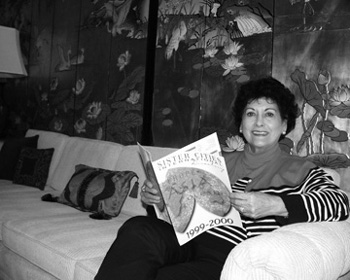| By
Donald H. Harrison
San Diego, CA (special) --One of the pioneers of the international Sister
Cities movement, Thelma Press, recently relocated with her husband, Lou,
from San Bernardino to San Diego because two of their five grown children
live here. Her arrival here reinvigorated efforts to link the City of San
Diego with an Israeli city in a Sister City partnership.
Exactly which city San Diego might be matched with is an open question
because of changes in the rules governing such pairings, Press said
during
an interview in her Mission Hills home, amid art works reflecting the
couple's world travel.
 |
Up until recently, foreign cities were precluded
from having more than one American city as a partner. As most major Israeli
cities already had longstanding U.S. partners, this had left San Diego
with relatively few choices.
Press, who is senior vice president of the U.S. Sister Cities rganization,
told HERITAGE that her fellow board members plan to change this rule
to permit foreign cities to have ultiple partners -- meaning that San Diego
would be free to institute a relationship with any Israeli city |
| THELMA PRESS |
which expressed mutual interest.
Prior to Press's arrival in San Diego, there had been some exploratory
talks about San Diego possibly pairing with Ashdod,
a port city, or
possibly with Netanya,
a coastal city which unfortunately has been in the
news lately as the site of a suicide bombing at a shopping mall.
While these two cities remain possibilities, there also is the possibility
now of a city such as Haifa,
which has many similarities to San Diego,
Press said. Haifa has been matched for many years with San Francisco,
but under the new rules it could also have a relationship with San
Diego,
she said.
As a high-tech research complex grew up around UCSD, so too has a
similar complex grown up around the Technion university complex in
Haifa.
In fact, Qualcomm of San Diego has a satellite operation in Haifa.
Like San
Diego, Haifa is a port city. Furthermore, it is a city with many religions,
being home to Jews, Muslims, and Christians as well as being the world
headquarters for the Baha'i faith. All of these commonalities, Press
said,
may suggest Haifa as San Diego's perfect match.
The Sister City official said a key to establishing a strong relationship
is
for a cross-section of citizens to come together in San Diego and create
a
nucleus of volunteers for future exchanges, home visits and the like.
If
you are interested in helping to create a Sister City relationship,
please
call Press at (619) 294-7275.
Once the citizen committee is in place, she said, the next step would
be to
seek formal approval from the City of San Diego and whatever city in
Israel is chosen. While San Diego's Mayor Dick Murphy has not made
any
promises, during his campaign he expressed strong interest in fostering
a
relationship with a city in Israel -- which he once visited as a guest
of
the United Jewish Federation.
San Diego already enjoys sister city relationships with 14 cities
throughout the world. Some of these relationships are strong, and
ongoing, while others have become moribund over the years. The countries
and the sister cities of San Diego are: Australia-Perth; Brazil-Campinas;
China-Yantai; Ghana-Tema; Japan-Yokohama; Korea-Chonju; Mexico-Leon
and Tijuana; Philippines-Cavite City; Poland-Warsaw Province; Russia-
Vladivostok; Scotland-Edinburgh; Spain-Acala de Henares; Taiwan-
Taichung City.
Similarly, San Bernardino has relationships with nine cities, among
them
Herzliya, Israel. "San Bernardino has a Lighthouse for the Blind, which
has
an interaction with their blind institute," Press said. "We had a student
exchange, and we had a teacher exchange for teachers who wok with
dyslexic students."
The Sister Cities program was an outgrowth of the People-to-People
program created by President Dwight D. Eisenhower. In 1959, neighbors
in
San Bernardino invited Press to host a Japanese student and to participate
in what then was known as a "Town Affiliation" program between San
Bernardino and Tachikawa, Japan.
Having known the Japanese as a World War II enemy in British India,
where
she grew up as the daughter of a British civil servant, Press said
she was
anxious to do whatever she could to help reduce prejudices between
nations. She said she wanted her own children to grow up appreciating
diversity, so welcomed the Japanese student to her home. Today, that
student works as an interpreter for the Japanese foreign ministry.
As more and more American cities began affiliating with towns and cities
in other countries, it was realized that a formal association should
be
created. Frank Curran, who was then San Diego's mayor, was among the
original group of incorporators who created the Sister Cities Association
of the United States in June of 1967. Curran also was elected to the
organization's original board of directors. In 1970 the organization
held
its annual convention in San Diego, and returned to the city in 1980
and
1997.
Early in the 1970s, Press was appointed as the California state
representative of Sister Cities International, a position in which
she
traveled throughout the state and the world in the cause of fostering
new
relationships. She became a national board member of the organization
in
1978, a position from which she plans to "retire" at the next annual
meeting this July. "Retire" may be too strong a word because she plans
to
take on the responsibility of serving as vice president of the recently
created Sister Cities Foundation, and also has become vice president
for
affiliations of San Diego's local Sister Cities organization.
Her husband, Lou, who owned a lumber business, served as president of
the
San Bernardino-Tachikawa Sister City Association, as well as president
of Temple Emanu-El in San Bernardino. After the first Japanese student
came to stay with them, there were several others who became part of
the
Press's extended family. |

